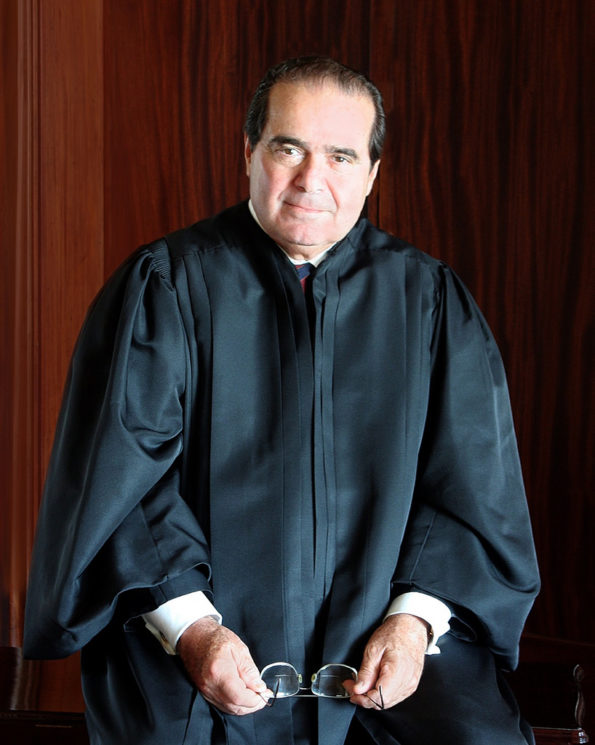[dropcap]I[/dropcap]n my view, there is only one legitimate way to interpret the constitution: the way it was intended to be read by its authors. I believe that originalism is the best constitutional doctrine for a number of reasons. Originalism is a theory of interpretation of legal texts, including most notably the Constitution. Originalists believe that the constitutional text ought to be given the original public meaning that it would have had at the time it became law. Ensuring citizens that what the constitution meant when it was written, or when amendments were added will still hold their same meaning as when originally adopted. Supreme Court Associate Justice Antonin Scalia defined “originalism” this way: [perfectpullquote align=”left” bordertop=”false” cite=”” link=”” color=”” class=”” size=””]”The constitution that I interpret and apply is not living but dead, or as I prefer to call it, enduring. It means today not what current society, much less the court, thinks it ought to mean, but what it meant when it was adopted.”[/perfectpullquote]
I think this quote sums up originalism the best, while also doing a thorough job of defining it too. Before I explain more about originalism I will provide you with reasons for why we must choose to use originalism when interpreting the constitution and other historical documents.

Firstly, I believe that originalism ensures that we most closely stick to the founders’ intent. When we read Shakespeare, we do not attribute modern definitions the words he uses. We read those words as they would have been understood during his time. To interpret his works using modern definitions would render them incomprehensible. Thus, this same standard should apply to all historical tests. It is preposterous to think that a document has any other meaning other than that fixed at its time of conception. Interpreting the constitution to what we want it to mean according to the times has made it such that the intent of the authors has effectively been ignored, and has allowed for massive federal and judicial overreach in issues that should be left to democratic choice.
Next, I believe in originalism because it is the best doctrine to limit the federal government. In my view, the federal government should do no more than explicitly authorized by Article 1, Section 8 of the Constitution. Expansionist readings of this document have allowed the federal government to usurp far more powers than appropriate. Furthermore, using the doctrine of “the living constitution,” the Supreme Court has stripped from the states their right under the 10th amendment to uphold social morality as they see fit, especially regarding sexual morality, by inventing rights through the false notion of “substantive due process”. This is seen in such cases as Griswold v. Connecticut, Roe v. Wade, Lawrence v. Texas, US v. Windsor, and Obergefell v. Hodges. Regardless of one’s opinions on any of these issues, it should be accepted that none of these issues are addressed in the constitution, not to mention protected as rights. Through substantive due process, the court has invented rights nowhere to be found in the constitution and has forced them down the states. I believe that any “right” that is not explicitly protected by the Constitution’s original meaning, or which is not rooted in America’s history and thus protected by the 9th amendment, is not a constitutionally guaranteed right at all, and so should be left up to the states.
Originalism has its fair share of critics as well: It could be argued that as Justice Breyer has stated, [perfectpullquote align=”right” bordertop=”false” cite=”” link=”” color=”” class=”” size=””]“constitutions are meant to endure over time and to do so their interpretation must, therefore, be more flexible and responsive to changing circumstances.”[/perfectpullquote]
Other critiques of the methodology can reign from how does one adequately interpret broad and unspecified phrases to a general disagreement of interpreting a document by historical definitions and norms. Take for example the death penalty and the phrase “cruel and unusual punishment” an originalist would argue that because the death penalty was not understood or interpreted as “cruel and unusual” punishment during the time the constitution was ratified, that in essence would make the questioning of the death penalty on a constitutional basis null and void. Many proponents of an evolving or living constitution would suggest that by today’s standards many people see punishment by death as “cruel and unusual” therefore it could be ruled unconstitutional. It is important to note that although originalists do not see the death penalty as unconstitutional many believe it is up to the states to decide whether or not they are going to maintain the death penalty, due to wavering beliefs on the topic, they argue it may be a very bad idea or even an intolerable idea but it is not unconstitutional.

Thomas Jefferson stated [perfectpullquote align=”left” bordertop=”false” cite=”” link=”” color=”” class=”” size=””]“If a constitution as interpreted can truly be changed at the decree of a judge, then the purpose of the constitution would be defeated, and there would be no reason to have one.”[/perfectpullquote]
As I stated earlier it is imperative that the Law of the Land’s meaning does not significantly change or alter at a judges edict. The preceding reasons are why I am an unabashed supporter of originalism, I believe it protects the Integrity of our constitution and government, and keeping us more in line with our founders intents.
Featured Image: https://pixabay.com/en/constitution-4th-of-july-july-4th-1486010/
